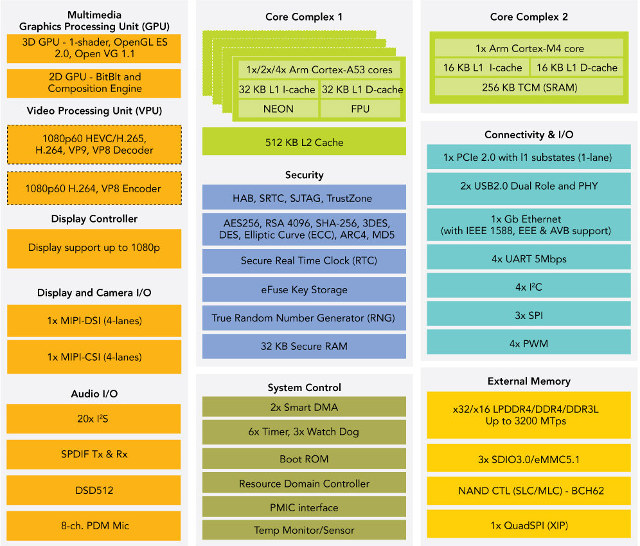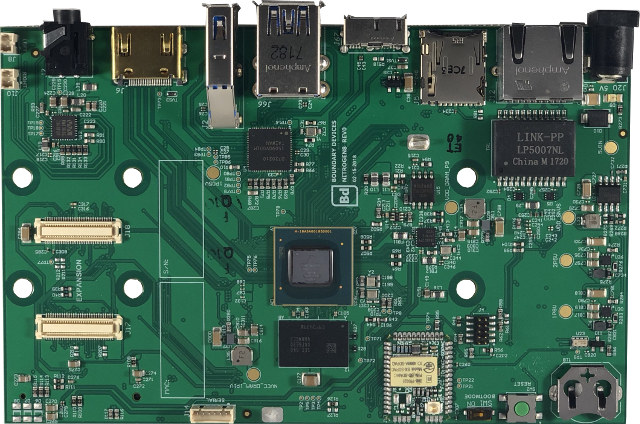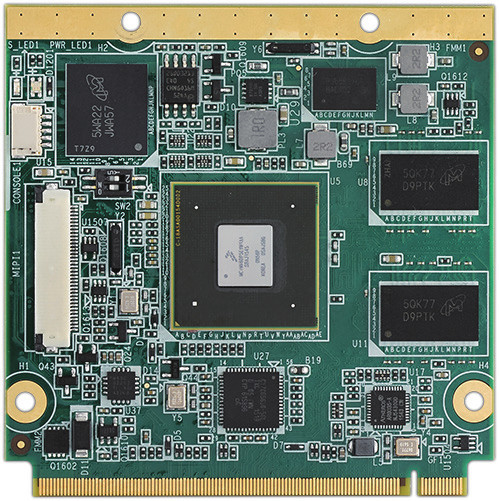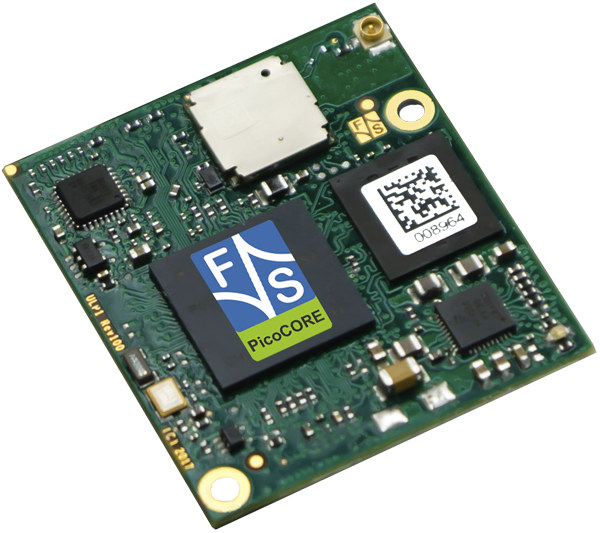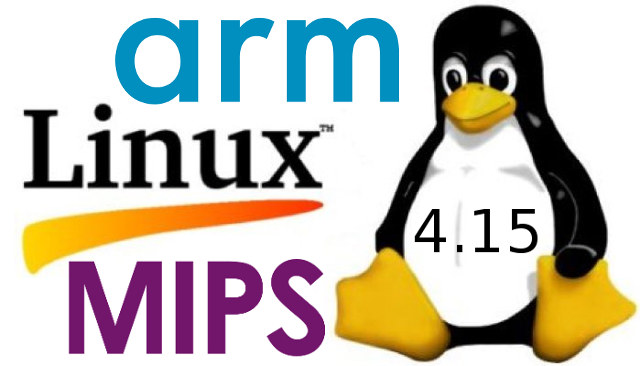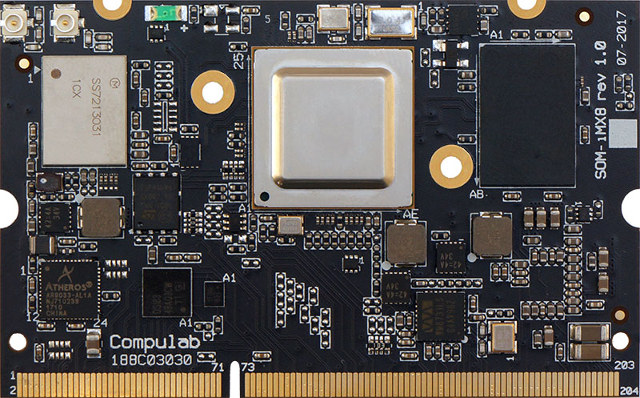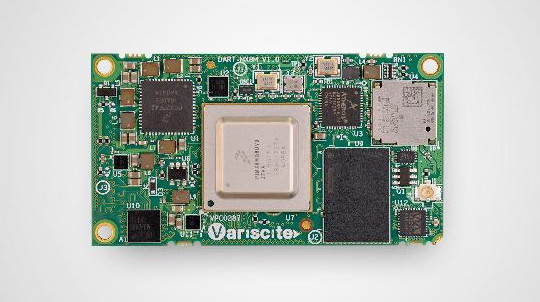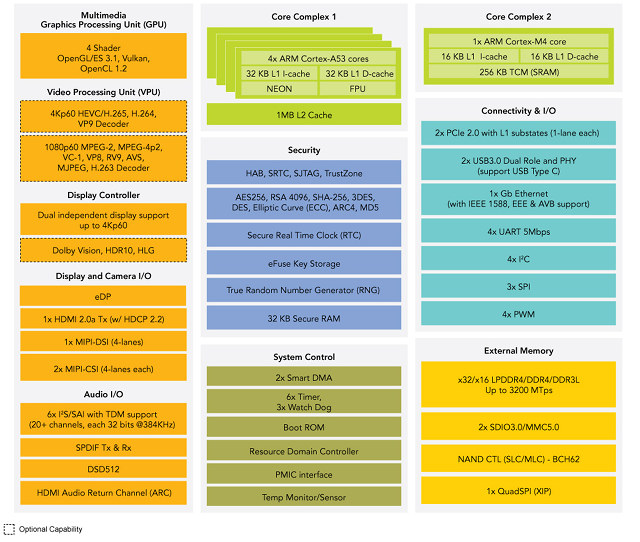NXP i.MX 8, i.MX 8M, and i.MX 8X processors are barely available, but the company has already announced another member of their i.MX8 family with i.MX 8M Mini processors with one to four Cortex A53 application cores, one Cortex-M4F real-time core, 2D/ 3D graphics accelerator, and support for 1080p video playback and output. Apart from the lack of 4K support, that looks about the same as i.MX 8, but there’s one important difference: the manufacturing process. i.MX 8M Mini processors are manufactured using 14LPC FinFET process technology allowing the Cortex A53 cores to reach 2.0 GHz, and the Cortex-M4F core can be clocked up to 400+ MHz. Some video interfaces have also been removed from the new processor such as embedded DisplayPort and HDMI 2.0a. NXP i.MX 8M Mini key features: Application cores – One to four Arm Cortex-A53 cores up to 2GHz Real-time core – Arm Cortex-M4 at speeds […]
Nitrogen8M Single Board Computer with NXP i.MX 8MQuad Processor Comes with Up to 4GB RAM, 128 GB Storage
Boundary Devices Nitrogen6X was one of the first boards based on Freescale i.MX 6 processor when it launched in 2012, and even I never owned their board personally, I liked the fact the company published frequent updates about software development on their blog. With NXP i.MX 8 processors now officially available, the company introduced an update to their SBC with Nitrogen8X powered by NXP i.MX 8MQ quad-core processor, with 2 to 4 GB LPDDR4 RAM, 8 to 128 GB flash, a certified wireless module for WiFi and Bluetooth, and more. The form factor has changed dramatically, however. Nitrogen8M specifications: SoC – NXP i.MX 8MQuad ((Dual, QuadLite available on request) with four Cortex A53 core @ up to 1.5 GHz, one Cortex-M4F real-time core, and a Vivante GC7000Lite 2D/3D GPU System Memory – 2 or 4GB LPDDR4 (2GB standard) Storage – 16MB QSPI NOR Flash, 8GB eMMC flash (expandable to 128 […]
Advantech ROM-7720 is a Qseven 2.1 Compliant i.MX 8 QuadMax Computer-on-Module
Many solutions based on NXP i.MX8 processors are likely to be announced during Embedded World 2018 next week. We’ve already seen several NXP i.MX 8M Cortex A53 based modules such as Variscite DART-MX8M or Compulab CL-SOM-IMX8 systems-on-module, and more are coming. One of those will be Advantech ROM-7720 computer-on-module (CoM) featuring the top of the line NXP i.MX 8 QuadMax Cortex A72/A53 processor and following QSeven 2.1 specifications / form factor. Advantech ROM-7720 CoM specifications: SoC – NXP i.MX 8QuadMax processor with 2x Cortex A72 cores @ up to 1.6GHz, 4x Cortex A53 cores, 2x Cortex-M4F real-time cores, a HiFi 4 DSP, and 2x Vivante GC7000XSVX GPUs System Memory – 2GB LPDDR4 @ 1600 MHz (optional 4GB RAM) Storage – 8 GB eMMC Flash for OS, 64 MB Quad SPI Flash for boot loader Video Output / Display I/F 2x 24-bit LVDS, 1366 x 768 for 1ch; 1920 x 1080 […]
PicoCORE MX7ULP is a Compact Module Based on NXP i.MX 7ULP Ultra Low Power Processor
NXP unveiled another variant of their i.MX 7 Cortex A7 processor last year, and I missed it. NXP i.MX 7ULP offers many of the same features as i.MX 7, but is manufactured using FD-SOI (Fully Depleted Silicon On Insulator) process technology to offer lower power consumption, as low as 15 mW or less in deep sleep, or 17 times less in comparison to i.MX 7 devices, while the dynamic power efficiency is improved by 50 percent on the real time domain (Cortex-M4). I found out about it thanks to an email from F&S Elektronik Systeme about the introduction of their PicoCORE MX7ULP module – based on i.MX 7ULP processor – at the Embedded World 2018 conference. PicoCORE MX7ULP CoM specifications: SoC – NXP i.MX 7ULP Arm Cortex-A7 processor @ up to 800 MHz, with Arm Cortex-M4 real-time core, and 2D/3D graphics accelerator System Memory – Up to 1GB LPDDR3 Storage […]
Linux 4.15 Release – Main Changes, Arm and MIPS Architectures
Linus Torvald has released Linux 4.15 last Sunday: After a release cycle that was unusual in so many (bad) ways, this last week was really pleasant. Quiet and small, and no last-minute panics, just small fixes for various issues. I never got a feeling that I’d need to extend things by yet another week, and 4.15 looks fine to me. Half the changes in the last week were misc driver stuff (gpu, input, networking) with the other half being a mix of networking, core kernel and arch updates (mainly x86). But all of it is tiny. So at least we had one good week. This obviously was not a pleasant release cycle, with the whole meltdown/spectre thing coming in in the middle of the cycle and not really gelling with our normal release cycle. The extra two weeks were obviously mainly due to that whole timing issue. Also, it is […]
Compulab CL-SOM-iMX8 SoM Features NXP i.MX 8M Processor for $68 and Up
I just covered one of the i.MX 8M systems-on-module last Friday with Variscite DART-MX8M SoM, but Variscite is not the only company about to launch such modules, and today I’ll have a look at Compulab CL-SOM-iMX8 system-on-module based on the same NXP i.MX 8M dual or quad core Cortex A53 processor. Compulab’s SoM comes with up to 4GB RAM, 64GB eMMC flash, an optional WiFi & Bluetooth module, as well as optional support for Ethernet, LVDS, analog audio, and more. Contrary to most competitors, the company has also made an habit of releasing detailed pricing the basic configuration and per option. But first, let’s go through the specifications: SoC (one of the other) NXP i.MX8M Quad quad core Arm Cortex-A53 processor @ 1.5GHz with Arm Corex-M4 real-time core, Vivante GC7000Lite GPU supporting OpenGL ES 3.1, Open CL 1.2 and Vulkan NXP i.MX8M Dual dual core Arm Cortex-A53 processor @ 1.5GHz […]
Variscite DART-MX8M is a Compact NXP i.MX 8M System-on-Module
NXP has recently launched their i.MX 8M evaluation kit and released documentation, so we can expect multiple products based on the family in 2018. The new NXP i.MX 64-bit processors include three families with i.MX 8, i.MX 8X, and i.MX 8M, but so far it looks like many companies are launching products based on the latter. The Embedded World Conference 2018 at the end of February should be the occasion for many product launches, especially systems-on-module and related development kit, but several companies have already posted information about their i.MX 8(M) modules minus pricing, and one of those is Variscite DART MX8M a company (55x30mm) module with i.MX 8M processor, up to 4GB LPDDR4, up to 64GB eMMC flash, as well as 802.11ac WiFi and Bluetooth 4.0. Variscite DART-MX8M specifications: SoC – NXP i.MX8M with dual or quad core Cortex A53 processor @ up to 1.5 GHz, Cortex-M4 real-time core […]
Develop NXP i.MX 8M Voice Controlled Smart Devices with MCIMX8M-EVK Evaluation Kit
We first heard about NXP i.MX 8M processsors in October 2016, and at the end of last year, WandPi 8M development board was unveiled with shipping scheduled for Q2 2018 once the processor will start manufacturing. Other exciting i.MX 8M projects include Purism Librem 5 smartphone, MNT Reform DIY modular computer, and I’m sure there will be others development board & products, and plenty of system-on-modules introduced with the processor in 2018. NXP i.MX 8M processor also got in the news at CES 2018, because it will be one of the hardware platforms certified for Android Things, and NXP also issued a press release to announced the processor’s multimedia capability with be used in voice controlled devices with or without video. The PR refers to Gartner Research saying that “voice commands will dominate 50 percent of all searches in the next two years”, and explains that with thinner and thinner […]


